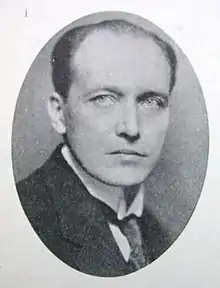Anders Örne | |
|---|---|
 Anders Örne while serving as the general director of the Post Office Administration in 1929 | |
| Minister of Communications (Transport) | |
| In office 1921–1923 | |
| Prime Minister | Hjalmar Branting |
| Personal details | |
| Born | Anders Emmanuel Örne 1881 |
| Died | 1956 (aged 74–75) |
| Nationality | Swedish |
| Political party | Social Democratic Party |
| Alma mater | Uppsala University |
Anders Örne (1881–1956) was a Swedish politician who served as the minister of communications (transport) between 1921 and 1923. He also headed the Cooperative Society and Post Office Administration. In addition, he was a member of the Social Democratic Party.
Biography
Örne was born in 1881.[1] He received a bachelor's degree from Uppsala University.[1] As of 1911 he was the editor of Kooperatören, a magazine published by the Swedish Cooperative Society.[2] Later Örne became the secretary general of the Swedish Cooperative Society, and in 1918 he translated a document of the weavers cooperative in Rochdale which was the first cooperative to lay the foundations of these organizations in Sweden.[3] The document included a number of principles of operating cooperatives, and Örne employed the seventh principle as the basis of the organization of the Swedish cooperatives with some adaptations.[3] While serving in this post he was appointed minister of communications (transport) to the cabinet led by Prime Minister Hjalmar Branting in 1921.[4] He was also a member of the Riksdag for the Social Democratic Party between 1919 and 1934.[1][5] Then he served as the general director of the Post Office Administration in the period 1926–1946.[1][5]
Örne was the author of various books mostly on cooperatives[6] and advocated the idea of dual nationalism in his books which refers to the focus on individual countries in the Nordic region and also, on their common cultures and goals.[7] One of his books on cooperatives was translated into English in 1926.[8]
He died in 1956.[1]
References
- 1 2 3 4 5 "Örne, Anders" (in Swedish). Swedish Cooperatives Union (KF). Archived from the original on 18 September 2020. Retrieved 1 November 2021.
- ↑ Anders Jacobson (2021). Separatism and cooperation: Democratic participation, asset-building and narrative representations in The Women's Cooperative Society Swedish Homes, 1904-1916 (PDF) (MA thesis). Stockholm University. p. 33.
- 1 2 Elin Gardeström (2018). "Propaganda as marketing. Conceptual meanings of propaganda and advertisement in Sweden in the 1930s". Journal of Historical Research in Marketing. 10 (4): 485–486. doi:10.1108/JHRM-11-2017-0071. S2CID 149746908.
- ↑ Dankwart A. Rustow (2015). Politics of Compromise. Princeton, NJ: Princeton University Press. p. 156. ISBN 978-1-4008-7858-1.
- 1 2 Johan Strang (2009). "The Scandinavian Value Nihilists. The Crisis of Democracy in the 1930s and 1940s" (PDF). Nordeuropa-Forum. 19 (1): 43. ISSN 0940-5585.
- ↑ "Örne, Anders Emmanuel 1881". WorldCat. Retrieved 1 November 2021.
- ↑ Eirikur Bergmann (2016). Nordic Nationalism and Right-Wing Populist Politics: Imperial Relationships and National Sentiments. London: Palgrave Macmillan UK. p. 5. ISBN 978-1-137-56703-1.
- ↑ Mary Hilson (August 2011). "A Consumers' International? The International Cooperative Alliance and Cooperative Internationalism, 1918–1939: A Nordic Perspective". International Review of Social History. 56 (2): 221. doi:10.1017/S0020859011000150. JSTOR /44583880. S2CID 145143769.
External links
 Media related to Anders Örne at Wikimedia Commons
Media related to Anders Örne at Wikimedia Commons